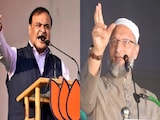Republican candidate Donald Trump has clocked a significant victory in the US elections, setting up his mandate to drive into power by January. Hours after his victory was clear, the Taliban-led interim government in Kabul released a carefully worded statement online that reflected its attempts to formalise its diplomatic presence on the regional and global stage, and, by extension, market its political reality as the sole source of power and governance in Kabul. The biggest goal for the Taliban right now is to achieve international legitimacy. To some extent, it has managed to do so. While the drama of the US elections was still unfolding, Indian officials were already in Kabul to continue what is a contested, difficult, yet critical engagement with the Taliban. This visit included a first meeting with the acting defence minister of the Islamic Emirate, Mullah Yaqoob, who is also Taliban founder Mullah Omar's eldest son. India has a strong history of people-to-people ties with Afghanistan and maintenance of the same remains a top priority despite initial hiccups over visa allocations and allowing access to Afghans after 2021.
A Complex Statement
The Taliban's statement stopped short of congratulating Trump on his victory (ideologically, as per their interpretation of Sharia, democracy is not recognised by the group), but it did express hope that a pragmatic approach would be taken towards Afghanistan. It further reminded the world about the success of the Doha agreement between the Taliban and the Trump administration which had ended a two-decade-long war. Interestingly, in the statement's finale, the Taliban expressed hope that the Trump administration would work to end the wars in Gaza and Lebanon. Like many in the region, the Taliban has also taken a strong stance against Israel, putting its weight behind the Palestinian cause but without expressing overt support for either Hamas or Hezbollah, both of which have been designated as terror groups in multiple countries since the mid-1990s.
For the Taliban, its political survival today is of paramount importance, and its fragility as a political system palpable. The Taliban hierarchy had a relationship with the Trump administration—especially with former US special envoy for Afghanistan, Zalmay Khalilzad. Trump has also previously criticised the way the Biden administration conducted the exit from the country. The President-elect in September said that the US should have retained control of the Bagram Airfield, the biggest military installation the US operated 60 km outside Kabul. He based this argument not on counter-terrorism or on the suggestion to deal with the Taliban directly, but on Afghanistan's proximity to China and the swathes of natural resources there that remain untapped. True, during his campaign, Trump did promise to “get back” Bagram. But it is still highly unlikely that the US under him will actually return to the country in any formalised capacity. It also remains to be seen how Republicans under Trump will view anti-Taliban groups, and whether support for them will find renewed interest within the party.
Taliban's Growing Engagement
Naturally, with the US out of Afghanistan now and Trump back in power at the White House, the Taliban will have to dig in deep to remain politically engaged with the US. The group has in fact made notable strides in engaging regional and international communities. It has re-marketed itself as a palatably extremist group that can take on more nefarious, violent and globally expanding groups, such as the Islamic State Khorasan (ISKP). In the Middle East, it has operationalised embassies in the United Arab Emirates (UAE) and Oman, while maintaining its political anchoring in Qatar. Taliban's key ideologue, Sirajuddin Haqqani, even got a travel exemption from the United Nations Security Council and flew to Saudi Arabia for the Hajj pilgrimage. He also visited the UAE, which the Taliban has long had relations with.
The larger anxiety for the Taliban regarding a Trump presidency will come from his erratic decision-making. This is particularly important in the sense that multiple Islamist groups have taken part in the Taliban's wars over the decades, including Al Qaeda. There's a view that Al Qaeda did not announce a chief after the assassination of Ayman al-Zawahiri in Kabul due to the Taliban's pressure on the group.
Trump is expected to take a hard stand on Iran too in the coming years. This is based not only on predictions, but facts. His administration unilaterally withdrew the US from the nuclear agreement of 2015. In the Gulf as well, despite normalisation between Saudi Arabia and Iran, a harder position by Washington would be welcomed. “Bad news for Tehran and its proxies. Netanyahu is the big winner. It is time to go after Iran's nuclear facilities,” said noted UAE public intellectual Abdulkhaleq Abdulla on social media shortly after Trump's victory.
The Iran Question
One of the core gains that Iran has seen over the past few years has been the exit of the US in Afghanistan. Even though Tehran does not particularly agree with or enjoy the Taliban as a neighbour, it sees functional relations with them as more palatable than American military presence on both sides of its eastern and western borders. With its ‘forward defence' strategy involving proxies in Syria, Iraq, and Yemen, and a relatively calm border with Afghanistan, Tehran hopes to put enough distance between itself and US forces in the region. Taliban, whether it likes it or not, is part of this design. In February, much to the Taliban's concern, Iran's special envoy to Afghanistan, Hassan Kazemi Qom, had alluded to Afghanistan being part of Iran's ‘Axis of Resistance'. Under the now-slain Quds Force chief, Qassem Soleimani, Iran's Islamic Revolutionary Guard Corps (IRGC) even recruited Shias from Afghanistan for the Fatemiyoun Brigade fighting across Syria and Iraq.
The Taliban's options are limited. If there is a broader conflict between Israel and Iran, it will have little choice but to cosy up to, if not fully join, Tehran's positions. The group's ideological underpinnings will make it hard for the movement to have a rational or diplomatic position. Groups residing in Afghanistan may mobilise on their own merit or make the state a staging ground, as has happened before. This would be a direct challenge to the Taliban's efforts to project political neutrality.
A Period Of Uncertainty
Afghanistan remains a state in flux even if it has been able to engage with several countries, including India. It continues to deal with internal ideological battles between power centres in Kabul and Kandahar, border clashes with its former patron Pakistan, and economic vows. But the fact that it has managed to strike a deal with the US and regain control and power is also a success story, one that has been celebrated widely from Al Qaeda to Hamas.
While Trump's gaze is not expected to land in this part of geography anytime soon—including on Bagram—his presidency will be a test for the Taliban's political and diplomatic acumen, just as it will be for the rest of the world.
(The author is Deputy Director and Fellow, Strategic Studies Programme, Observer Research Foundation)
Disclaimer: These are the personal opinions of the author















